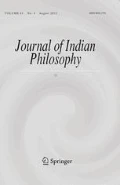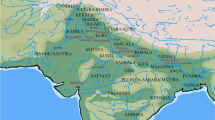Abstract
The literature of Bhartṛhari and Maṇḍana attention in contemporary times. The writings of the prominent linguistic philosopher and grammarian Bhartṛhari and of Manḍana, an encyclopedic scholar of later seventh century and most likely a senior contemporary of Śaṅkara, shape Indian philosophical thinking to a great extent. On this premise, this study of the influence of Bhartṛhari on Maṇḍana’s literature, the scope of this essay, allows us to explore the significance of Bhartṛhari’s writings, not only to comprehend the philosophy of language, but also to understand the contribution of linguistic philosophy in shaping Advaita philosophy in subsequent times. This comparison is not to question originality on the part of Maṇḍana, but rather to explore the interrelationship between linguistic philosophy and the monistic philosophy of the Upaniṣadic tradition. Besides excavating the role of Bhartṛhari writings on the texts of Maṇḍana, analysis this will reveal the interrelatedness of the Advaita school of Śaṅkara often addressed as ‘pure non-dualism’ (Kevalādvaita) and the Advaita of Bhartṛhari, identified as ‘non-dualism of the word-principle’ (Śabdādvaita).
Similar content being viewed by others
References
Biardeau, M. (1964). Vākyapadīya Brahmakāṇḍa: Avec la Vṛtti de Harivṛṣabha. Paris: Ēditions E. De Boccard.
Böhtlingk, O. (1991). In K. Fassung (Ed.), Nachtröge zum Sanskrit Wörterbuch. Delhi: Motilal Banarsidass Publishers.
Brahmasiddhi. (1937/1984). In K. Shastri (Ed.), Brahmasiddhi of Maṇḍana Miśra. Delhi: Satguru Publications.
Hacker, P. (1953). Vivarta: Studien zur Geschichte der Illusionistichen Kosmologie und Erkenntnistheorie der Inder. Wiesbaden: Akademie der Wissenschaften und der Geistes-u. Socialwissenschaft.
Iyer, K. A. S. (1966). Vākyapadīya of Bhartṛhari. With the Vṛtti and the Paddhati of Vṛṣabhadeva. Poona: Deccan College.
Iyer, K. A. S. (1992). Bhartṛhari: A study of the Vākyapadīya in the light of the ancient commentaries. Pune: Deccan College.
Mahābhāṣya. (1987). The Mahābhāṣya of Patañjali. With the commentaries Pradīpa and Uddyota. (Vols. 1–6). (B. Shastri, Ed.), Delhi: Chaukhamba Sanskrit Pratisthan.
Thrasher, A. W. (1993). The Advaita Vedānta of Brahmasiddhi. Delhi: Motilal Banarsidass.
Vākyapadīya. (1988). Vākyapadīya (Vol. 1). Brahmakāṇḍa. (R. Sharma, Ed.), Vārāṇasī: Sampurnanda University.
Author information
Authors and Affiliations
Corresponding author
Rights and permissions
About this article
Cite this article
Timalsina, S. The Brahman and the Word Principle (Śabda). J Indian Philos 37, 189–206 (2009). https://doi.org/10.1007/s10781-009-9065-0
Published:
Issue Date:
DOI: https://doi.org/10.1007/s10781-009-9065-0




